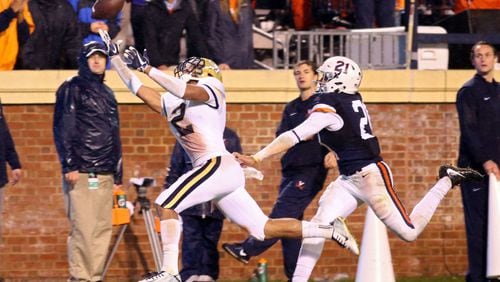The last in a series of stories examining how Georgia Tech, which began its season with hopes of playing for the ACC championship, instead ended up with a 5-6 record.
Georgia Tech safety Corey Griffin had it about right.
“Make one more play,” Griffin said following the season-ending loss to Georgia. “One more play. I mean, that’s it. You look at it. Tennessee, one point. Miami, one point. Virginia, four points.”
The Yellow Jackets’ 2017 season might be summarized best in that way. Tech’s failure to come up with one more play in three games – the losses to Tennessee, Miami and Virginia – rendered what could have been a special season into one that ended with a 5-6 record, no bowl trip and deep disappointment.
The Jackets are hardly alone. It happens every season. In the ACC alone, N.C. State and Florida State began the season with the highest aspirations and fell precipitously. Duke coach David Cutcliffe called his team the most athletic and deepest he’d had in 10 seasons, and the Blue Devils finished 6-6 (including, lest we forget, a 43-20 win over Tech). The line between success and failure in college football is often razor thin.
As clearly as the season just past, Tech’s 11-win season in 2014 demonstrates the nature of the game that is, depending on the season, confounding or exhilarating. Tech needed the questionable overturn of a forward-pass ruling to escape Georgia Southern, converted a fourth-and-15 to rally against Virginia Tech and beat Georgia thanks in part to a 53-yard field goal that barely cleared the crossbar. Without those three results, the Jackets would have finished the regular season with a 7-5 record (or worse, if those games, had they been losses, created a snowball effect), which wouldn’t have been good enough for the ACC Coastal title and a spot in the conference championship and certainly not for a place in the Orange Bowl.
Tech lived the other side of the coin this season. It would be excessive to ascribe the ultimate outcomes of both seasons to randomness. In 2014, Tech took advantage of the overturned forward-pass call (Georgia Southern was driving late in the game with a three-point lead and the chance to ice the game when it lost possession) and drove for the winning touchdown. The Jackets leveraged the conversion of the fourth-and-15 to score 10 points in the final 2:03. After Harrison Butker’s field goal to force overtime, the Jackets completed the mission and beat the Bulldogs for the first time since 2008.
This season, Tech had opportunities to win each of those three one-possession games and couldn’t seize upon them. Using the loss to Tennessee as an example, the game was rife with opportunities to secure a victory. The last play – the failed two-point try in double overtime – may be the most obvious, but it was preceded by two missed field goals and two lost fumbles that both were turned into 14 points. But those plays were just the beginning.
In two second-quarter drives alone, there were perhaps five plays that, had the Jackets executed better, the outcome could have changed.
On the Tech drive that preceded Tennessee’s first scoring drive, quarterback TaQuon Marshall fumbled the ball away on a 3rd-and-7. That’s one play. But Marshall could have avoided the fumble altogether by converting the first down on the previous down with a better throw.
On the ensuing Tennessee drive, loose coverage on a 3rd-and-3 and a muted blitz enabled a conversion. Better tackling on two plays later in the drive might have likewise caused Tennessee to settle for a field goal instead of advance toward its first touchdown of the game, seven points that proved crucial to the outcome.
And, obviously, there were many more such plays after that, and the same could be said of the losses to Miami and Virginia. In a similar way, there were plays in the 2014 season that have been long since forgotten that nudged Tech towards those aforementioned season-defining moments.
It isn’t as though Tech didn’t make big plays that could have helped win those games for the Jackets. Had the Jackets beaten Virginia, linebacker Bruce Jordan-Swilling’s interception return for a touchdown would have been hailed as crucial. Against Miami, safety A.J. Gray denied the Hurricanes a two-point conversion by deflecting Malik Rosier’s pass into the end zone. But there weren’t enough of them.
Perhaps the lesson of the season is that a game-winning play can happen at any point in the game. If it is, it’s one that Marshall has already absorbed.
“Everyone sees the results at the end, but it could be something in the second quarter with 12 minutes left that happens that could cause something at the end of the game,” Marshall said. “It’s not always something at the end. It’s just the end result was, it came down to either we had to score or we had to get a stop.”
About the Author







